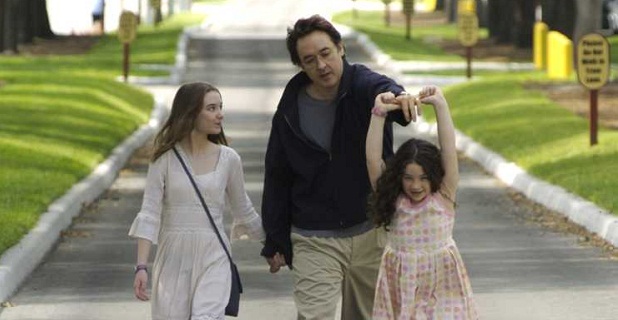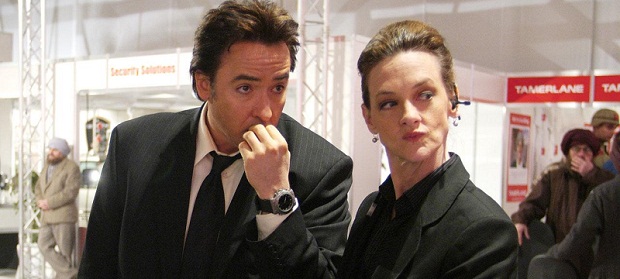Welcome to Casting Call. In this series I’ll be taking a look at the people who, arguably, most profoundly and most visibly effect our response to cinema; the actors. Each week I’ll profile and look at the career of an actor from one of the week’s cinema, blu ray or dvd releases, and discuss several of their films and performances.
Today, Spike Jonze’ bizarre Being John Malkovich arrives on Blu Ray, so it’s time to look at the career of one of the most likeable actors around; John Cusack.
 Name: John Paul Cusack
Name: John Paul Cusack
Age: 45
Born: June 28th 1966, Evanston Illinois
Family: Parents Dick and Nancy Cusack, siblings Ann, Joan, Bill, Susie
First Film: Class (1983)
Next Film(s): The Factory / The Raven / Frozen Ground
John Cusack, the son of an actor father and maths teacher mother, started acting early, training initially with the parents of his lifelong friend Jeremy Piven. He also started working in film relatively early, making his first impression Aged seventeen in John Hughes’ Sixteen Candles. However, Cusack’s first leading role (and one that set the template somewhat for his early teen movie roles) came in Rob Reiner’s second – hugely underrated – film The Sure Thing, which was essentially a teen movie take on It Happened One Night, with Cusack and Daphne Zuniga playing college students forced to cross the country together. Another early teen movie, and one that Cusack now disdains despite its many charms, was the zany Better Off Dead, it’s no surprise that Savage Steve Holland’s film flopped on release – the whole first half has Cusack’s Lane Meyer trying to kill himself after being dumped by his girlfriend, but the incredibly offbeat humour of the film also means that it’s no surprise that it has since developed a dedicated cult following.
Cusack, a serious actor, always wanted to break out of these roles and do something more substantive and dramatic, and even early in his career he was stretching his dramatic muscles with films like Stand By Me and Eight Men Out (about a baseball fixing scandal in 1919). This decision to move away from playing high schoolers almost led to Cusack turning down one of his best known and best loved roles; that of Lloyd Dobler in Say Anything (of which, more below).
Following Say Anything, Cusack set about developing a truly eclectic career, seemingly choosing his projects based on scripts and people he found interesting, rather than any huge commercial pressures. The Grifters was the film that really saw Cusack emerge as an adult actor, playing a hard edged con man who has a complex relationship with his mother (Angelica Huston) he couldn’t really have been further from Lloyd Dobler, there were many films that didn’t find the mark commercially or critically (Map of the Human Heart anyone? No, really, anyone?) but Cusack’s intriguing taste led to roles in both interesting movies that got overlooked (notably Fat Man and Little Boy, about the Manhattan Project) and some hilariously misconcieved films too (The Road to Wellville, which is so odd you really should see it).
The next phase of Cusack’s caareer, the moment that took him to the mainstream, began with the first film on which he was one of the co-writers; Grosse Pointe Blank. An often hilarious and also rather heartfelt romantic comedy about a hitman returning home for his high school reunion, Grosse Pointe Blank marries wit, sharp performances from Cusack, Dan Ayckroyd as a hitman who wants to unionise, Cusack’s sister Joan and Minnie Driver among others and some very strong action scenes in one of the great action comedies – and pointed the way, perhaps, for his subsequent role in Con Air. In Blank, and several other films at this time, Cusack seemed to be playing an older, wiser, variation on his teen movie persona (Blank could easily be kickboxing enthusiast Lloyd Dobler if you assumed things went wrong at end of Say Anything).
From around the late 90’s, Cusack seems to have settled in to a rather familiar Hollywood pattern of doing ‘one for them’ and ‘one for me’, so a pair of personal gourmet meals like Being John Malkovich and High Fidelity were followed by the Big Mac and Fries likes of America’s Sweethearts and Serendipity. Even when he makes things like Must Love Dogs though, you have to forgive Cusack, for two reasons; first off he’s just so bloody likeable, in movies, and indeed off screen he comes off as a ridiculously cool guy who you’d like to hang out and talk about music with, and secondly, he still leavens the disappointing likes of The Ice Harvest and Martian Child with dedicated performances in the more offbeat likes of 1408 (a horror movie as one man show) and Grace is Gone (again, see below). Even when the films aren’t that promising, I’m always tempted to see anything that Cusack is in, because he’ll almost always throw something cool at you; something he’ll play a different way than you’d expect perhaps, or even just a nice nod to a great band, there’s almost always something to enjoy in a John Cusack performance.
BEST FILM: Say Anything… (1989)

I have a few films that are personality tests, that tell me how I’m going to get on with a person, for example, if you also recognise Pretty Woman as the cinematic sewage it is, we’ll probably get on just fine. Say Anything is one of these films, I’ve shown it to more people than I can count and I don’t think any of them has ever disliked it, and if I do ever meet someone who doesn’t like this movie I will regard them with suspicion, because really, Say Anything is one of the best teen movies ever made.
The key to it for me is just how great both Cusack (as Lloyd Dobler, who has just graduated, but hasn’t yet figured out what to do with his life besides kickboxing) and Ione Skye (as Diane Court, as Cameron Crowe’s script has it, “a brain in the body of a game show hostess”) are, and how much chemistry they have as this outwardly unlikely couple gets together. There is the over earnestness that is typical of teenagers (“She gave me a pen, I gave her my heart and she gave me a pen”), but they also seem like real people, and the performances and dialogue take great pains to make sure that we see how their relationship develops.
It’s not just the performances though, or I’d be talking about this below. Say Anything strikes me as an honest film, it doesn’t end with a kiss or a wedding, it ends with hope, but also with doubt, which suits its bittersweet tone. People often forget the prominence of John Mahoney as Skye’s father; a complex piece of acting and writing that really enriches the film, but thankfully they do remember the other beautifully crafted writing, be it Joan Cusack as Lloyd’s caring but flustered Sister or Lili Taylor’s wonderful Corey, who has written more than 60 songs about her ex-boyfriend. As much as the quotable dialogue or the iconic image of Lloyd with a boom box held above his head, what makes Say Anything wonderful is that you believe in and recognise these characters and the world they live in.
BEST PERFORMANCE: Grace Is Gone (2007)

There is – at least in most audiences minds – a ‘John Cusack Performance’, you know, that slightly cocky guy that you can’t help liking because the cockiness is a cover for a deeper vulnerability. It’s Lloyd Dobler, it’s Martin Blank, It’s Lane Meyer. It’s not Stanley Philipps, the man he plays in Grace is Gone.
Stanley is a man in his mid thirties, left at home with his daughters while his wife is off fighting the Iraq war. When he gets the news that his wife has been killed Stanley can’t bring himself to tell his children, so he takes them on a roadtrip instead, looking for the moment when he can say to his kids that their Mother is dead. It’s a sombre part in a sombre film, and I barely recognised Cusack in it. His usual ebullience is absent, and he wears thick glasses (the reason Stanley, much to his chagrin, couldn’t fight with or instead of his wife). Even before he hears the devastating news, Stanley is an almost uncomfortably sad character.
Cusack is brilliant here, he doesn’t overplay the part, because the emotion is raw enough anyway, instead he does less, but makes a huge impact with small moments, like the way that Stanley reacts when he calls to check his answerphone messages, just so he can hear his wife’s voice, and the way he consistently almost tells his daughters (lovely performances by Shelan O’Keefe and Gracie Bednarczyk) what has happened, but then pulls back. Unaccountably, Grace is Gone has never been released in the UK, which is crazy, as it is probably the best film yet made about what the Iraq war has cost us, and Cusack’s performance is the key to how and why that is true.
ONE TO MISS: War, Inc (2008)

There are several contenders for this position which it would be unfair to pick on, because I haven’t seen them (so, yes, everyone who is about to ask, that’s why this section isn’t about 2012). War, Inc started life as a sort of sequel to Grosse Pointe Blank, with the concept of a political satire centring around Martin Blank having become an arms dealer. The idea of using the Martin Blank character went away, sadly the film did not follow and, after many drafts and at least one fired director, what we ended up with was a blunt and unfunny satire about war profiteering.
It didn’t even feel very timely, with better satire having been done by comedians and by The Daily Show when these issues were first emerging out of the big smoking hole that had been Iraq, and the issues it wants to discuss having been worked over ad nauseum in news media and many other films both better and worse than this one. The real undiscovered gem about the exploitation of war is Barry Levinson’s smart and funny Wag The Dog, this one can stay on the shelf.
Next Week: As Jurassic Park roars back into cinemas (sorry), Casting Call examines the career of the underrated Laura Dern.




